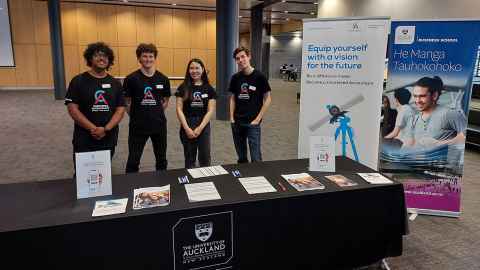ChatGPT versus Accounting
8 September 2023
How will AI affect the future of accounting? A recent industry event explored the impact of this extraordinary technology on the accounting industry.

As AI technology continues to both evolve and expand its reach across every aspect of modern society, developing an understanding of this and other transformative technologies has become essential in every industry – and accounting is no different. In recognition of this, the Business School partnered with Chartered Accountants Australia and New Zealand and MYOB to bring together secondary school students and teachers, first-year university students, and industry experts to discuss how current and future accountants can best navigate and, indeed, leverage this rapidly evolving landscape.
As Shailan Patel, Education Manager at MYOB, noted, "AI isn't just a disrupter; it's a creator and builder. It replaces jobs but also generates new opportunities, especially for the next generation of accountants."
AI isn't just a disrupter; it's a creator and builder. It replaces jobs but also generates new opportunities, especially for the next generation of accountants.
Held on Wednesday 16 August, the event involved presentations from two keynote speakers: Kayur Patel, a senior manager at PwC, and Helen Lu, a Senior Lecturer of Finance and FinTech Specialisation Lead at the University of Auckland. These presentations were followed by a panel discussion with Kayur, Helen, and Jesse Tang, a third-year BCom student and student representative for Chartered Accountants Australia and New Zealand, who was also a finalist in the 2023 EY Business Student of the Year Award.
As someone who works at the forefront of the intersection between technology and business, Kayur was well-placed to speak about the impact of Generative AI on the workforce, and its ability to assist chartered accountants in providing powerful insights. He discussed the possibility for future careers that do not yet exist, and gave examples of auditors potentially providing assurance and verification of media in the future. He also identified how essential it is for chartered accountants to be agile and adaptable and to focus on the creative, humanistic elements that will continue to be crucial in the future.
Chartered accountants have embraced AI, enabling its transformative power to enhance efficiency, accuracy, and innovation.
Helen Lu agreed. While she acknowledged that many routine jobs in accounting are being automated by transformative technologies like ChatGPT, “the good news is that these models will introduce new tasks demanding greater empathy and systematic thinking skills to bridge human needs to data insights.” In other words, there is more to be gained than lost for the accounting industry in the age of AI – as long as current and future accountants stay adaptable and informed. “It is vital for students to remain curious, stay abreast of tech trends, and embrace new AI tools as invaluable allies in preparing for their future careers,” she observed. “Moreover, to utilise AI assistants in accounting jobs, a deep understanding of the fundamentals of accounting domain knowledge becomes increasingly important.”
As a current student, Jesse Tang is only too aware of this. “The ChatGPT versus Accounting event underscored the increasing significance of critical thinking skills in our field. With the rise of AI, it's evident that tasks like bookkeeping are becoming obsolete, making adaptability and critical thinking skills crucial for current and future accountants navigating the evolving landscape," he said.
Secondary school teachers are very interested in talking about how students are using AI and how it will affect learning.
And let’s not forget that AI’s ability to facilitate and accelerate everyday processes can be liberating, as Christine McKinnon, Careers Engagement Manager at Chartered Accountants Australia and New Zealand, pointed out. “Chartered accountants have embraced AI, enabling its transformative power to enhance efficiency, accuracy, and innovation,” she explained. “AI [complements] the work of accountants; [because] it handles routine and repetitive tasks, it frees them up to focus on higher value tasks that require critical thinking, creativity and strategic decision-making.”
With such a diverse and engaged audience of high school students and their parents, teachers, career advisors, first-year students, and industry experts in attendance, it was not surprising that the panel discussion ran well over time. The lively and wide-ranging question and answer session further explored the future of accounting and the impact of AI on the industry, particularly in terms of the often complex role AI plays in teaching within secondary schools. “A lot of secondary school teachers attended, which was interesting, as that hasn’t happened before,” observed University of Auckland Employer Liaison Manager Lizzie Morris. “Secondary school teachers are very interested in talking about how students are using AI and how it will affect learning.”
It’s clear that the event was a resounding success. And the winner, in terms of the ChatGPT versus Accounting “contest”? Provided that attitudes remain future-focused and flexible, the answer is: everyone wins. As Shailan Patel explained, “AI and ChatGPT unlock innovation and efficiency in accounting. The future belongs to AI-enabled accountants. I encourage today's students to embrace technology, stay curious, ask questions, and seize the possibilities AI and new tech can bring."
A special thank you to Chartered Accountants Australia and New Zealand and MYOB for sponsoring this event.